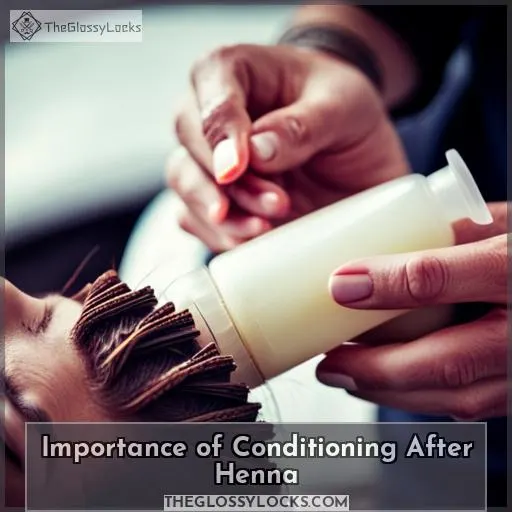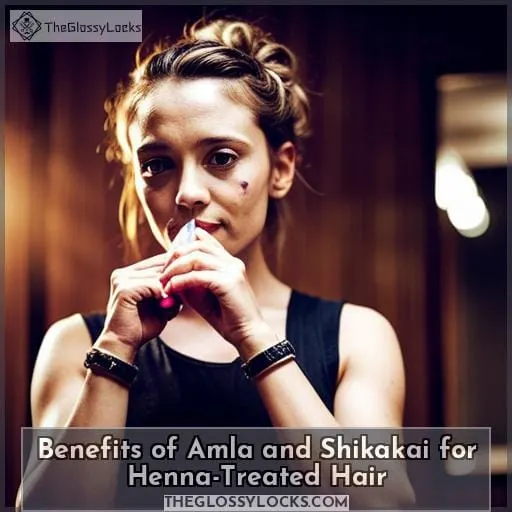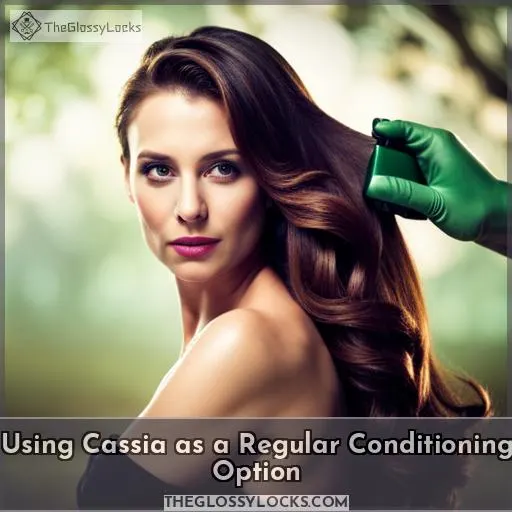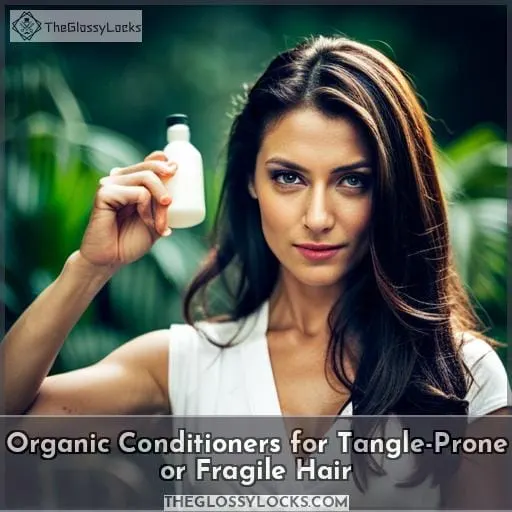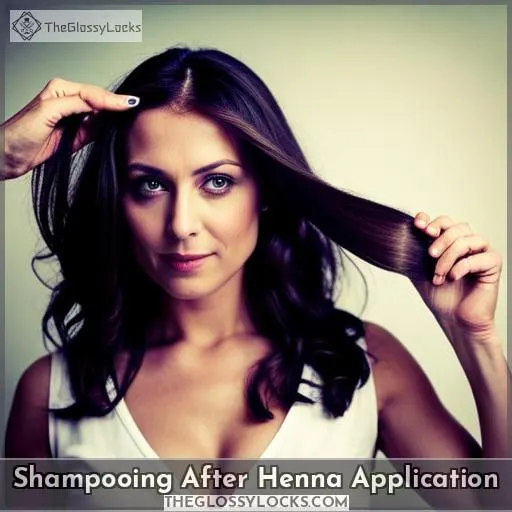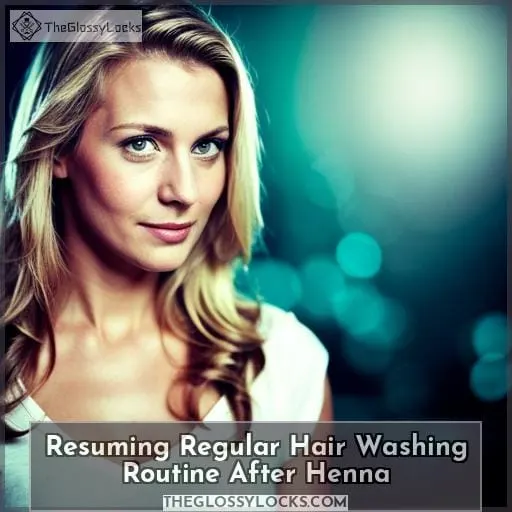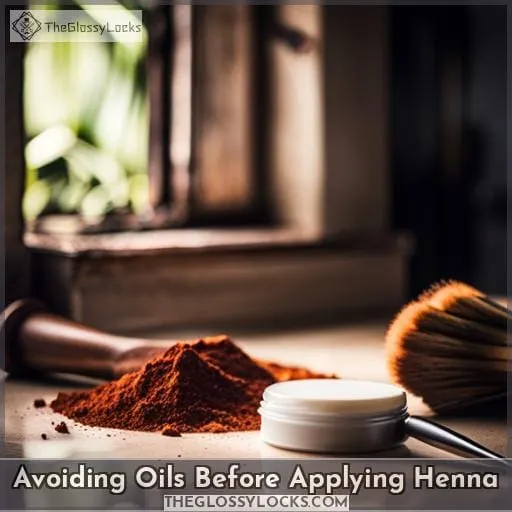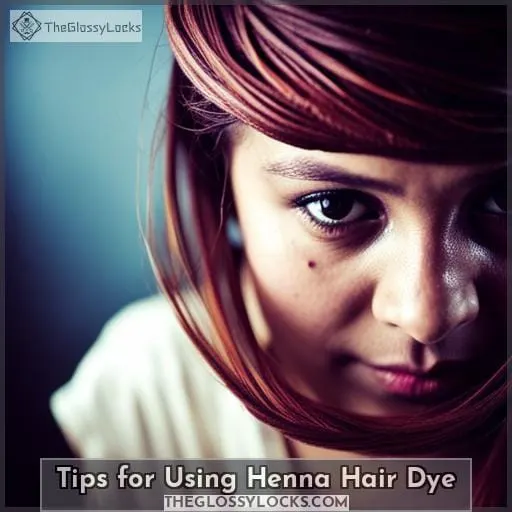This site is supported by our readers. We may earn a commission, at no cost to you, if you purchase through links.
 Looking for the best way to care for your henna-treated hair? You’ve come to the right place. In this article, we’ll provide you with essential conditioner tips that will keep your locks looking healthy and vibrant.
Looking for the best way to care for your henna-treated hair? You’ve come to the right place. In this article, we’ll provide you with essential conditioner tips that will keep your locks looking healthy and vibrant.
From moisturizing after henna application to choosing the right conditioner and avoiding harmful ingredients, we’ve got you covered. Discover how to maintain soft, nourished hair while rocking those stunning henna hues.
Table Of Contents
- Key Takeaways
- Importance of Conditioning After Henna
- Choosing the Right Conditioner for Henna-Treated Hair
- Benefits of Amla and Shikakai for Henna-Treated Hair
- Using Cassia as a Regular Conditioning Option
- Organic Conditioners for Tangle-Prone or Fragile Hair
- Shampooing After Henna Application
- Resuming Regular Hair Washing Routine After Henna
- Avoiding Oils Before Applying Henna
- Tips for Using Henna Hair Dye
- Frequently Asked Questions (FAQs)
- Can I use my regular conditioner after henna treatment?
- How often should I deep condition my hair after a henna application?
- Are there any specific ingredients I should avoid in conditioners for henna-treated hair?
- Can I use a leave-in conditioner after applying henna?
- Is it necessary to use a steamer for deep conditioning after henna, or are there alternative methods?
- Conclusion
Key Takeaways
- Henna can dry out hair, so conditioning is important to restore moisture and maintain hair health.
- Deep condition with a moisturizing conditioner mixed with oil for optimal results.
- Apply oils after henna to protect the color, soften the hair, and prevent dryness.
- Choose a conditioner without silicone and added protein, and opt for natural ingredients that promote moisture retention.
Importance of Conditioning After Henna
After applying henna to your hair, it’s crucial to condition it properly to combat its drying effects.
Moisturizing after henna helps restore softness and prevent the hair from feeling like straw.
Deep conditioning treatments and using oils can replenish moisture and maintain the health of your henna-treated hair.
Moisturizing After Henna
To maintain the health and hydration of your henna-treated hair, it’s crucial to prioritize moisturizing after the application.
Deep conditioning with a moisturizing conditioner is recommended to restore hair’s softness.
Consider using organic conditioners with ingredients like horsetail and coconut for tangle-prone or fragile hair.
Amla can be used as a masque for restoring curls in curly hair, while Cassia acts as a regular conditioning option.
These tips will help you keep your henna-treated locks nourished and healthy.
Deep Conditioning and Moisturizing Treatments
After applying henna, it’s crucial to prioritize deep conditioning and moisturizing treatments to restore moisture and counteract the drying effects of the dye.
- Deep condition with a moisturizing conditioner mixed with oil for optimal results.
- Consider using a steamer during deep conditioning for added benefits.
- Choose protein-free deep treatments to replenish moisture and maintain hair health.
- Regularly apply a daily moisturizer to keep your hair hydrated throughout the week and ensure henna hair color longevity.
Using Oils on Henna-Treated Hair
To maintain the health and hydration of your henna-treated hair, it’s important to use oils as part of your conditioning routine.
Applying oils after henna helps protect the color, soften the hair, and prevent dryness.
Oils like argan or macadamia can be applied post-henna for added moisture and softness.
Avoid applying oils before henna application to prevent color issues.
Incorporating oil into your post-henna care will help keep your hair nourished and vibrant.
Choosing the Right Conditioner for Henna-Treated Hair
When it comes to choosing the right conditioner for henna-treated hair, it’s important to avoid mainstream conditioners that contain silicone.
These types of conditioners can weigh down your hair and potentially interfere with the color results of your henna treatment.
Instead, opt for organic or natural conditioners that are free from silicones and contain hydrating ingredients like coconut oil or aloe vera to help restore moisture and maintain the health of your henna-treated hair.
Conditioning Henna Dyed Hair
When conditioning henna dyed hair, it’s important to choose the right conditioner that suits your needs and enhances the benefits of henna.
Here are some tips for selecting a conditioner for your henna-treated hair:
- Look for moisturizing conditioners with natural ingredients.
- Avoid conditioners with added protein, as henna already acts as a protein treatment.
- Choose conditioners that promote moisture retention and maintain overall hair health.
- Opt for color-safe formulas to help maintain the vibrancy of your henna dye.
- Consider using deep conditioning treatments specifically designed for post-henna care.
Avoiding Mainstream Conditioners With Silicone
When conditioning henna-dyed hair, it’s important to avoid mainstream conditioners with silicone for optimal results.
Silicone can weigh down the hair and leave it feeling heavy and greasy.
Instead, opt for silicone-free alternatives that provide moisture and nourishment without weighing down the strands.
Look for moisturizing masks or natural conditioning options that are specifically designed for henna-treated hair.
These products will help maintain the color vibrancy while keeping your locks healthy and hydrated after henna application.
Benefits of Amla and Shikakai for Henna-Treated Hair
When it comes to caring for your henna-treated hair, deep conditioning is essential.
Amla and Shikakai are two ingredients that can provide numerous benefits when used as conditioners after a henna treatment. These natural substances help moisturize the hair, improve its texture, and promote overall scalp health without adding any additional protein that may lead to dryness or stiffness.
When choosing a conditioner for your henna-treated hair, opt for products containing Amla and Shikakai to nourish and maintain the vibrancy of your color-treated locks.
Deep conditioning benefits
For henna-treated hair, you can experience deep conditioning benefits by incorporating Amla and Shikakai into your hair care routine.
These natural ingredients prevent protein overload, reduce hair breakage, improve hair elasticity, and restore shine to your locks.
By using products containing Amla and Shikakai regularly after coloring with henna, you can maintain the health of your treated hair while enjoying its vibrant color.
Say goodbye to dryness and damage with these nourishing additions to your post-henna regimen.
Moisturizing treatments recommended
To maintain the moisture and health of your henna-treated hair, it’s recommended to incorporate moisturizing treatments such as Amla and Shikakai. These Ayurvedic remedies are known for their nourishing properties that can deeply hydrate and revitalize your hair.
You can use hot oil treatments with oils like mustard oil or opt for steam therapy using a hair steamer.
Additionally, incorporating leave-in conditioners into your routine can help keep your henna-treated hair soft, manageable, and well-moisturized.
Choosing protein-free conditioners
Using protein-free conditioners is essential for maintaining the health and vibrancy of your henna-treated hair.
When choosing a conditioner for your henna-dyed locks, it’s important to avoid:
- Cones
- Sulfates
- Proteins
Instead, opt for moisturizers that will counteract the drying effects of henna and leave your hair soft and manageable.
Using steam during deep conditioning can further enhance moisture retention without affecting color results.
Using Cassia as a Regular Conditioning Option
Now that we’ve explored the benefits of Amla and Shikakai for henna-treated hair, let’s delve into another excellent conditioning option: cassia.
Cassia is often referred to as neutral henna because it shares some similarities with its more well-known counterpart. This natural herb has been used for centuries to promote healthy hair growth, combat hair loss, and improve overall scalp health.
One of the main advantages of using cassia as a regular conditioner is its ability to provide deep hydration without altering your hair color. Unlike henna, which imparts a reddish-orange tint when applied repeatedly, cassia doesn’t change or darken your existing shade.
Additionally, cassia offers various nutrients that can nourish and strengthen your strands from root to tip. Its high content of vitamins C and B complexes helps stimulate collagen production in the scalp while enhancing blood circulation—both crucial factors in promoting healthy hair growth.
However beneficial it may be, like any product or ingredient on our list today: there are potential side effects you should take note of before incorporating this herb into your routine.
Organic Conditioners for Tangle-Prone or Fragile Hair
If you have tangle-prone or fragile hair, consider using organic conditioners to keep your locks nourished and manageable. Organic conditioners offer a natural alternative that avoids harsh chemicals which can further damage delicate hair.
Here are three top choices for organic conditioners:
- Look for products that contain aloe vera, known for its soothing and moisturizing properties.
- Avoid protein-based conditioners as they can make your hair stiff and rough.
- Consider incorporating hot oil treatments into your routine to provide deep conditioning and hydration.
Using these organic options will help you maintain the health of your tangle-prone or fragile hair without weighing it down with heavy chemicals. Remember to incorporate deep conditioning treatments regularly, such as steam therapy, along with the use of these nourishing organic products to achieve optimal results in maintaining softness and manageability.
Shampooing After Henna Application
After applying henna to your hair, it’s important to know when and how to shampoo.
To prevent interference with the oxidation process and color issues, allow 48 hours for the henna to fully develop before washing.
When choosing a shampoo for henna dyed hair, opt for natural options that are sulfate-free and free from harsh degreasers like sodium laureth sulfate (SleS).
Look for hydrating ingredients like coconut oil or aloe vera in order to maintain moisture and preserve the vibrant color of your henna-treated hair.
When to Wash Your Hair After Henna
After applying henna, it’s important to wait for 48-72 hours before washing your hair.
Washing your hair too soon can interfere with the oxidation process and result in less vibrant color payoff.
When rinsing out the henna, use cold water instead of hot water as it helps seal in the color and prevent fading.
Cold water also helps maintain natural oils on your scalp for healthier-looking hair.
Choosing the Right Shampoo for Henna Dyed Hair
When shampooing after henna application, it’s important to choose the right shampoo for your henna dyed hair.
Avoid clarifying shampoos that can strip away the color and opt for sulfate-free options instead.
Cold water rinses during the coloring process help seal in the color, and if needed, use a gentle no-poo method with detergent-free alternatives like soapnuts.
Look for natural shampoos free from sulfates, parabens, and silicones that contain hydrating ingredients like coconut oil and aloe vera.
Resuming Regular Hair Washing Routine After Henna
Now that your henna treatment has settled and the color has fully developed, it’s time to resume your regular hair washing routine.
When it comes to shampooing after henna, it’s important to avoid sulfate and anti-dandruff shampoos as they can cause color fading.
Instead, opt for natural shampoos that are free from sulfates, parabens, and silicones to keep your henna dye intact while providing hydration with ingredients like coconut oil and aloe vera.
Avoiding Sulfate and Anti-Dandruff Shampoos
To continue caring for your henna-treated hair, it’s important to avoid using sulfate and anti-dandruff shampoos as you resume your regular hair washing routine. These types of shampoos can strip the color from your hair and cause dryness or irritation on the scalp.
Instead, opt for natural shampoos that are free from sulfates, parabens, and silicones. Look for hydrating ingredients like coconut oil and aloe vera to keep your hair moisturized while maintaining the vibrancy of the henna color.
Using Natural Shampoos
To continue caring for your henna-treated hair, it’s important to use natural shampoos when resuming your regular washing routine.
Opt for sulfate-free shampoos that are clarifying, gentle, nourishing, and moisturizing. These types of shampoos will help maintain the health and vibrancy of your henna color while keeping your hair hydrated and free from harsh chemicals.
Look for products with hydrating ingredients like coconut oil and aloe vera to ensure optimal care for your henna-treated locks.
Avoiding Oils Before Applying Henna
Before applying henna to your hair, it’s important to avoid using oils.
Oils can create a barrier on the hair shaft, preventing the henna from fully penetrating and resulting in uneven color or poor coverage.
Instead, focus on moisturizing and hydrating your hair after the 48-hour settling time by using oils like argan or macadamia for softening and hydration.
Remember to use a small amount of protective oil on your ends before heat styling but be cautious of mousses, gels, and sprays with alcohol that can dry out your hair and affect the color results.
Applying Oils After Henna for Softening and Hydration
To maintain softness and hydration after applying henna, you can apply oils to your hair.
Hot oil treatments are a great way to nourish your hair and add moisture back in.
Avoid using oils before applying henna as they can interfere with the dye uptake process.
Using Protective Hair Oil Before Heat Styling
Before heat styling your henna-treated hair, use a small amount of protective hair oil on the ends to prevent damage and maintain hydration.
Applying a heat protectant oil can create a barrier between your hair and the hot tools, reducing the risk of breakage or split ends. It also helps to retain moisture in your strands while applying heat, preventing dryness and brittleness.
Remember to avoid using oils before applying henna as they may interfere with color absorption.
Tips for Using Henna Hair Dye
When using henna hair dye, it’s important to follow these tips for optimal results:
- Prepare a well-mixed henna paste:
- Ensure your henna mix is smooth and free of clumps by thoroughly mixing the powder with water or other liquids. This will ensure even color application.
- Incorporate steam therapy:
- Steam your hair during the henna application process to help open up the hair cuticles and allow better absorption of the dye. You can use a steamer or simply wrap your head in a warm towel.
- Use leave-in conditioner after rinsing:
- After rinsing out the henna, apply a moisturizing leave-in conditioner to keep your locks hydrated and soft. This will enhance both shine and manageability.
By following these tips, you can achieve vibrant and long-lasting color while keeping your strands nourished throughout every step of the Henna Hair Dye process.
Frequently Asked Questions (FAQs)
Can I use my regular conditioner after henna treatment?
Yes, you can use your regular conditioner after a henna treatment. However, it’s recommended to choose a moisturizing conditioner without added protein to counteract the drying effects of henna and maintain softness in your hair.
How often should I deep condition my hair after a henna application?
To maintain optimal hair health and moisture levels after a henna application, it’s recommended to deep condition your hair once a week.
This will help replenish moisture and prevent dryness caused by the henna treatment.
Are there any specific ingredients I should avoid in conditioners for henna-treated hair?
When choosing conditioners for henna-treated hair, avoid those with added protein as henna acts as a protein itself.
Opt for moisturizing conditioners that counteract the drying effects of henna, leaving your hair soft and manageable.
Can I use a leave-in conditioner after applying henna?
Yes, using a leave-in conditioner after applying henna is recommended.
It helps to further moisturize and protect your hair, keeping it soft and manageable.
Look for a leave-in conditioner without harsh chemicals or silicones for best results.
Is it necessary to use a steamer for deep conditioning after henna, or are there alternative methods?
To achieve optimal results, using a steamer for deep conditioning after henna is highly recommended.
However, if you don’t have access to a steamer, alternative methods such as covering your hair with a shower cap or towel can also help retain moisture during the conditioning process.
Conclusion
To keep your henna-treated hair looking its best, proper conditioning is essential.
After applying henna, moisturizing is key to maintaining soft and nourished locks.
Choose a conditioner specifically designed for henna-treated hair, avoiding mainstream options with silicone.
Incorporating natural ingredients like amla and shikakai can provide deep conditioning benefits and help retain moisture.
Consider using cassia as a regular conditioning option, and opt for organic conditioners for tangle-prone or fragile hair.
When shampooing, choose a gentle, sulfate-free option, and avoid oils before applying henna.
Follow these tips to unleash the full potential of your henna-treated hair.

